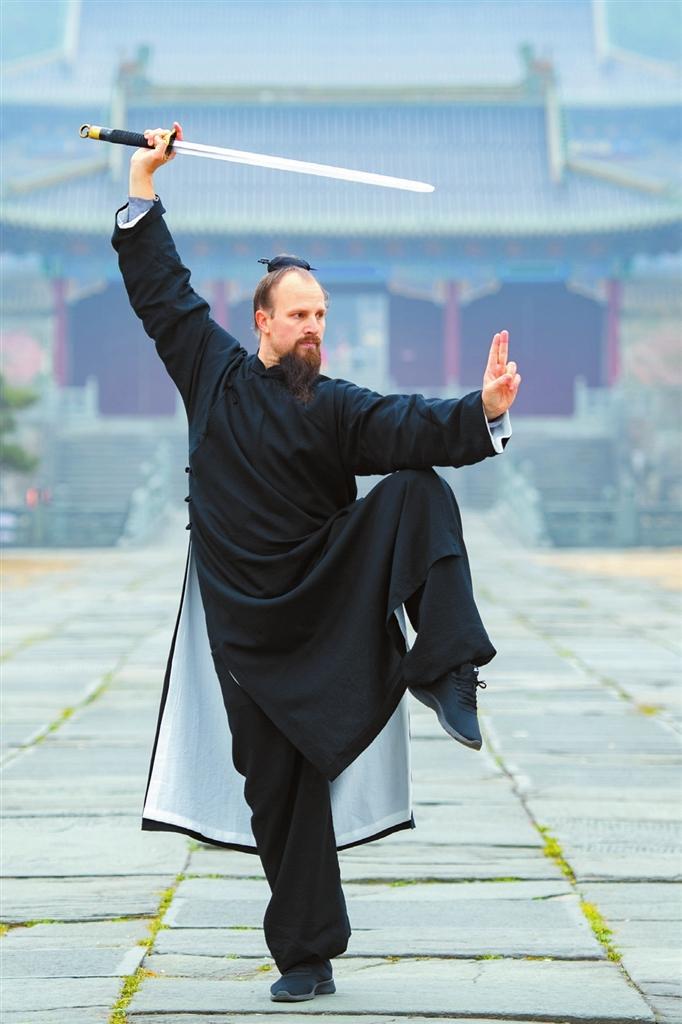
WITH a long hair in a bun, a goatee and a Taoist robe, Jake Pinnick has committed himself to learning tai chi for 12 years. His efforts resulted in him becoming a disciple of Yuan Shimao, the 15th inheritor of the Wudang Sanfeng Sect, a martial arts academy in the Wudang Mountains, Central China’s Hubei Province. Years of learning and practice have enabled Pinnick to grasp multiple forms of martial arts. “The martial arts have brought me great benefits, and the training is actually fun,” Pinnick says. “You can break down the moves, try to understand them, approach them differently, while the training keeps your mind very active and body very healthy,” he adds. Pinnick, 32, has taken on an additional challenge of playing the Chinese bamboo flute in recent years. His latest book, introducing the history of the bamboo flute and the skills required to play it, has got raving reviews online. “I found that many of my online followers were curious about the Chinese instrument after I uploaded my playing, so I thought I should publish an English tutorial so that my fans could learn along with me,” Pinnick says. He looked up a large volume of related Chinese books, extrapolated the key information and integrated his personal experiences. It took him nearly a year to finish the book, which also covers 108 classic musical works for bamboo flute. “I hope my book will enable foreigners online to understand the charm of the ancient Chinese traditional instrument,” he says. From Kewanee, a small city in Illinois, United States, Pinnick has been fascinated by Chinese martial arts since he was a kid, when he really enjoyed watching films featuring Chinese kung fu stars, such as Bruce Lee and Jackie Chan. “In our small town, there were no martial arts schools, and the ones in other cities didn’t feel very authentic to me,” Pinnick says. At the beginning of 2009, he chanced upon the website of Yuan’s academy, which was offering a five-year program for foreigners. “I thought it would be a great opportunity to learn kung fu and other disciplines and experience a new challenge,” he recalls. When he announced his plan to his family, they were supportive and felt that the experience would be a beneficial one. Pinnick then had to save up for his journey, so he started working two jobs. In May 2010, he arrived at Wuhan, capital of Hubei, and then the Wudang Mountains in Danjiangkou City, northwest Hubei. “It was quite the adventure just getting there, because I didn’t speak Chinese,” he says. His mind, however, was set at ease upon arriving at the academy, where he found other international kung fu students were also there. “It was a nice transition, and they taught me Chinese and showed me where to get groceries,” Pinnick says, adding that it made it easy for him to get used to the local life. The Wudang Mountains are famous for the Taoist temples and the area is widely considered to be the birthplace of tai chi. The region’s deep history with traditional martial arts has appealed to many kung fu practitioners from home and abroad. Before the pandemic, about 400,000 international visitors came to the mountains for sightseeing and to appreciate its culture, according to the Wudang Mountains management committee. More than 8,000 of those visitors have stayed to practice martial arts, but very few of them can become official disciples of the masters. Pinnick finished his training at the academy in 2018 and decided to stay and help instruct students there. He had an advantage in teaching international students in terms of language and way of thinking. Pinnick usually gets up at 5:30 a.m. and practices tai chi from 6 to 7 a.m. One-and-a-half hours later, he goes to the academy’s Yuxu Temple to give instruction to students. After a short break, he will teach another session in the afternoon. When the night falls, he will share his understanding of kung fu and traditional Chinese culture online. “Life is just cozy here,” he says. In addition to martial arts, Pinnick has exposed himself to Chinese culture, especially Taoism, and explores the idea of living in harmony with the universe. He has also taken the time to learn Chinese musical instruments, such as guqin, a seven-stringed plucked instrument, with Yuan’s son, who is a guqin specialist. Then, he got his hands on a bamboo flute afterward, and was instantly taken with it. “In the process of searching for materials, I found that there were very few teaching books for the bamboo flute in foreign languages, almost none in fact. I had to find Chinese materials and then translate them, before attempting to learn the techniques and methods of playing,” he said. Pinnick’s wife Cao Lingling says she admires his perseverance. “He will give 100% to whatever he is focused on,” Cao says. As his bamboo flute skills improved, Pinnick came to realize how the instrument also has something in common with the martial arts. “To ensure the instrument produces a nice sound, it requires constant breath control, which is also important in kung fu practice,” he explains. Speaking about his future plans, Pinnick says he plans to take the HSK, or the Chinese Proficiency Test, and hopefully take a test on bamboo flute and embark on a professional music career. (China Daily) | 
